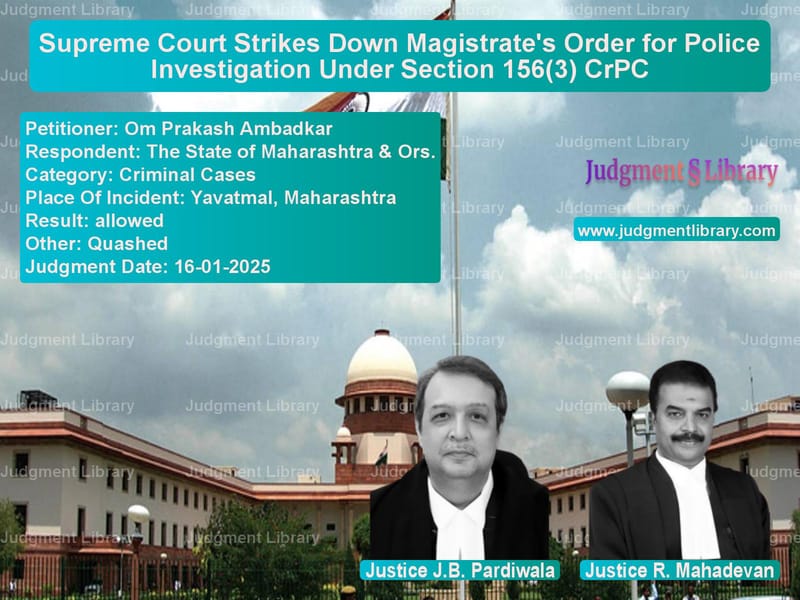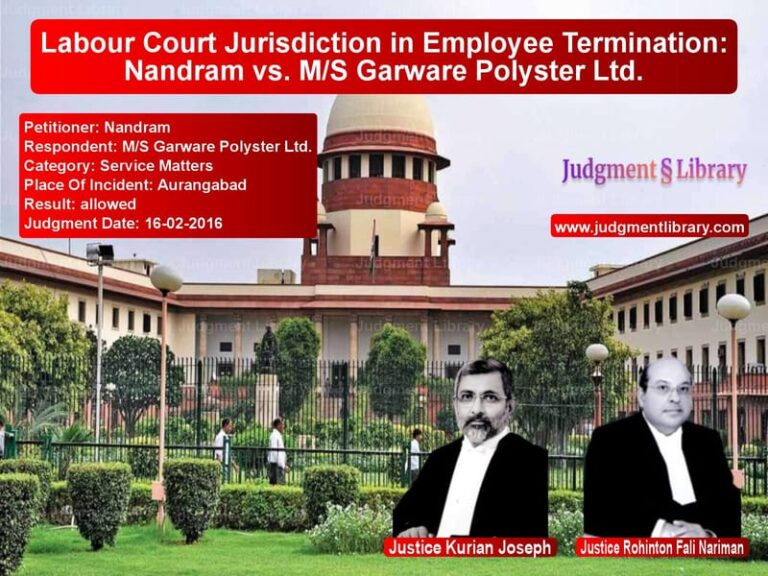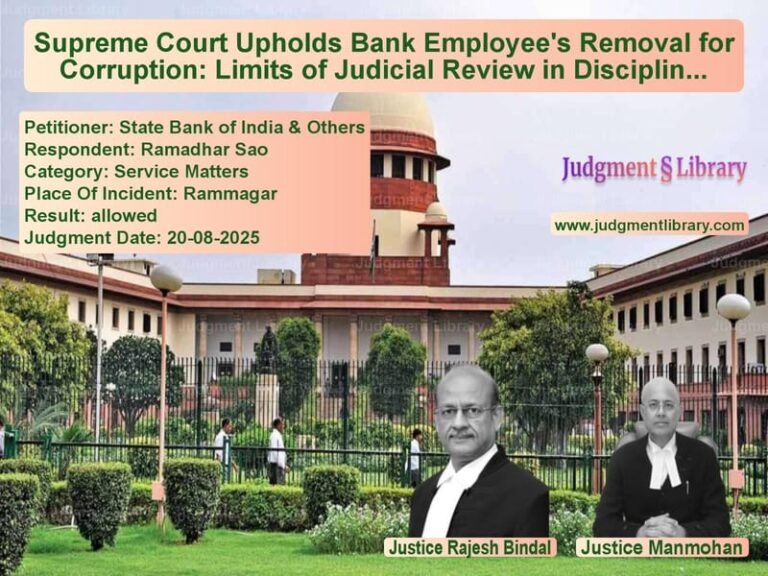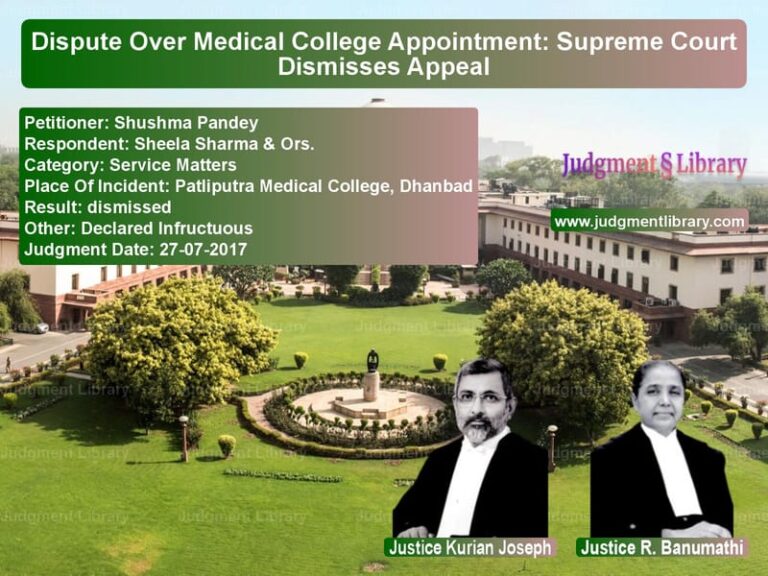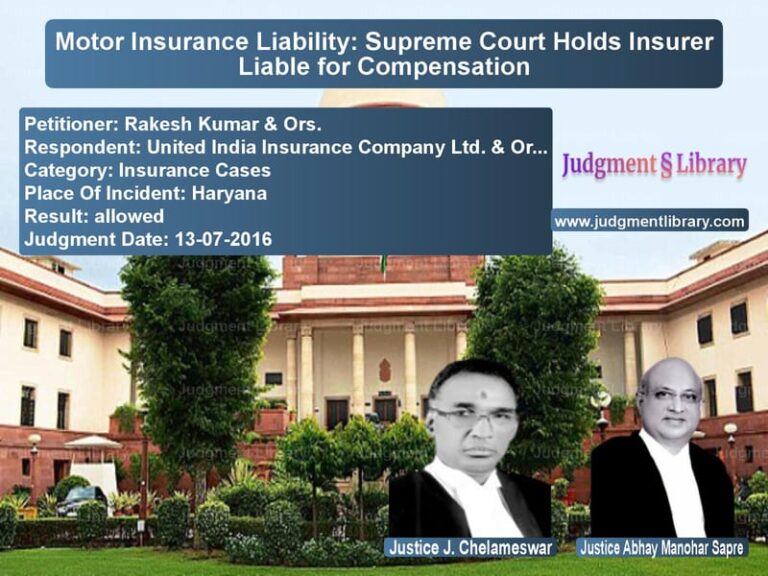Supreme Court Strikes Down Magistrate’s Order for Police Investigation Under Section 156(3) CrPC
The Supreme Court of India, in a significant ruling in Om Prakash Ambadkar v. The State of Maharashtra & Ors., quashed a Magistrate’s order directing police to investigate an alleged offense under Section 156(3) of the Code of Criminal Procedure (CrPC). The Court observed that such orders must be passed only after applying judicial mind and determining if a cognizable offense is disclosed.
Background of the Case
The case arose from an application filed by the complainant, an advocate, under Section 156(3) CrPC, seeking registration of an FIR against the appellant, a police officer, for alleged offenses under Sections 323, 294, 500, 504, and 506 IPC. The Magistrate allowed the application and directed police investigation. The appellant moved the Bombay High Court, which upheld the Magistrate’s order, leading to the present appeal before the Supreme Court.
Key Facts
- The complainant alleged that on December 31, 2011, he was humiliated by the appellant, a police officer.
- His attempt to lodge a complaint with the police station was unsuccessful.
- He approached the Bar Association, which supported his cause.
- The Superintendent of Police, Yavatmal, also did not take action.
- The complainant then filed an application under Section 156(3) CrPC before the Judicial Magistrate First Class, Digras.
- The Magistrate, without a detailed inquiry, directed the police to register an FIR and investigate the allegations.
- The High Court rejected the appellant’s plea to quash the order, leading to the appeal before the Supreme Court.
Legal Issues
Appellant’s Arguments
The appellant, Om Prakash Ambadkar, argued that:
- The Magistrate mechanically ordered police investigation without applying judicial mind.
- The allegations in the complaint did not disclose a cognizable offense.
- Under Section 294 IPC, mere abusive words do not amount to an offense unless they have a tendency to deprave and corrupt minds.
- Sections 504 and 506 IPC require a provocation or a threat capable of causing alarm, which was absent.
- The case was an abuse of process meant to harass the appellant, a police officer.
Respondent’s Arguments
The complainant, through the State of Maharashtra, contended that:
- The Magistrate had correctly exercised his discretion under Section 156(3) CrPC.
- The refusal of police to register the FIR justified judicial intervention.
- The allegations in the complaint should be treated as true at the initial stage.
- The appellant should face investigation before claiming innocence.
Supreme Court’s Observations
1. Judicial Scrutiny Before Ordering Investigation
The Court emphasized that a Magistrate must examine whether a complaint discloses a cognizable offense before directing an investigation under Section 156(3) CrPC.
- “A Magistrate is not a post office. He must apply his mind before ordering an investigation.”
- “If the allegations in the complaint do not disclose a cognizable offense, the Magistrate must refrain from invoking Section 156(3).”
2. No Prima Facie Case Under Section 294 IPC
The Court held that mere verbal abuse does not constitute an offense under Section 294 IPC unless it meets the test of obscenity.
- “The test of obscenity is whether the act has a tendency to deprave and corrupt minds.”
- “Mere abusive words, however offensive, do not automatically amount to an obscene act.”
3. No Ingredients of Criminal Intimidation
The Court observed that for an offense under Section 506 IPC (criminal intimidation), the threat must be capable of creating fear or compelling a person to act against their will.
- “A mere threat, without an intent to cause alarm, does not constitute criminal intimidation.”
- “The complaint lacks details showing the complainant was put in fear of injury.”
4. Magistrate’s Order Was Mechanical
The Court found that the Magistrate had passed the order without examining the contents of the complaint carefully.
- “A Magistrate should not pass an order under Section 156(3) CrPC mechanically.”
- “The order must demonstrate application of mind to the facts of the case.”
Key Precedents Cited
- Priyanka Srivastava v. State of U.P. (2015) 6 SCC 287: Held that applications under Section 156(3) CrPC must be accompanied by an affidavit and the Magistrate must apply judicial mind before ordering an investigation.
- Ramdev Food Products Ltd. v. State of Gujarat (2015) 6 SCC 439: Stated that courts must ensure a complaint discloses a cognizable offense before directing police investigation.
- N.S. Madhanagopal v. K. Lalitha (2022) 17 SCC 818: Defined the test of obscenity under Section 294 IPC.
Final Judgment
- The Supreme Court allowed the appeal and set aside the High Court’s judgment.
- The order of the Magistrate directing police investigation under Section 156(3) CrPC was quashed.
- The Court held that no prima facie case was made out under Sections 294, 504, 506, and 500 IPC.
- The complaint was dismissed as an abuse of process.
Implications of the Judgment
This ruling establishes critical legal principles:
- Ensures that Magistrates apply judicial mind before ordering investigations under Section 156(3) CrPC.
- Prevents misuse of criminal law to harass individuals through frivolous complaints.
- Clarifies that verbal abuse alone does not constitute an offense under Section 294 IPC.
- Reinforces the need for a real and credible threat to invoke criminal intimidation charges.
The judgment serves as a safeguard against arbitrary criminal proceedings and ensures that criminal law is not misused to settle personal scores.
Petitioner Name: Om Prakash Ambadkar.Respondent Name: The State of Maharashtra & Ors..Judgment By: Justice J.B. Pardiwala, Justice R. Mahadevan.Place Of Incident: Yavatmal, Maharashtra.Judgment Date: 16-01-2025.
Don’t miss out on the full details! Download the complete judgment in PDF format below and gain valuable insights instantly!
Download Judgment: om-prakash-ambadkar-vs-the-state-of-maharas-supreme-court-of-india-judgment-dated-16-01-2025.pdf
Directly Download Judgment: Directly download this Judgment
See all petitions in Bail and Anticipatory Bail
See all petitions in Fraud and Forgery
See all petitions in Custodial Deaths and Police Misconduct
See all petitions in Judgment by J.B. Pardiwala
See all petitions in Judgment by R. Mahadevan
See all petitions in allowed
See all petitions in Quashed
See all petitions in supreme court of India judgments January 2025
See all petitions in 2025 judgments
See all posts in Criminal Cases Category
See all allowed petitions in Criminal Cases Category
See all Dismissed petitions in Criminal Cases Category
See all partially allowed petitions in Criminal Cases Category

